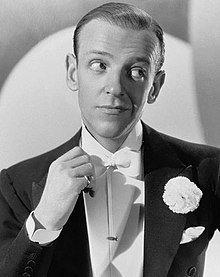
Back Fred Astaire Afrikaans Fred Astaire AN فريد أستير Arabic فريد استير ARZ Fred Astaire AST Fred Astaire Aymara Fred Aster Azerbaijani فرد آستر AZB Фред Астер Bashkir Фрэд Астэр Byelorussian
Fred Astaire | |
|---|---|
 Astaire in 1941 | |
| Born | Frederick Austerlitz May 10, 1899 Omaha, Nebraska, U.S. |
| Died | June 22, 1987 (aged 88) Los Angeles, California, U.S. |
| Resting place | Oakwood Memorial Park Cemetery |
| Occupations |
|
| Years active | 1904–1981 |
| Spouses | |
| Children | 2 |
| Relatives | Adele Astaire (sister) |
| Musical career | |
| Instruments |
|
| Labels | |
Fred Astaire (born Frederick Austerlitz,[1] May 10, 1899 – June 22, 1987) was an American dancer, actor, singer, musician, choreographer, and presenter, whose career in stage, film, and television spanned 76 years. He is widely regarded as the "greatest popular-music dancer of all time"[2] and received numerous accolades, including an Honorary Academy Award, three Primetime Emmy Awards, a BAFTA Award, two Golden Globe Awards, and a Grammy Award.
As a dancer, he was known for his uncanny sense of rhythm, creativity, effortless presentation, and tireless perfectionism, which was sometimes a burden to co-workers. His dancing showed elegance, grace, originality, and precision. He drew influences from many sources, including tap, classical dance, and the elevated style of Vernon and Irene Castle. His trademark style greatly influenced the American Smooth style of ballroom dance. He called his eclectic approach "outlaw style", a following an unpredictable and instinctive muse. His motion was economical, yet endlessly nuanced. Jerome Robbins stated, "Astaire's dancing looks so simple, so disarming, so easy, yet the understructure, the way he sets the steps on, over or against the music, is so surprising and inventive."[3]: 18
Astaire's most memorable dancing partnership was with Ginger Rogers, with whom he co-starred in 10 Hollywood musicals during the classic age of Hollywood cinema, including Top Hat (1935), Swing Time (1936), and Shall We Dance (1937).[4]
Astaire's fame grew in films like Holiday Inn (1942), Easter Parade (1948), The Band Wagon (1953), Funny Face (1957), and Silk Stockings (1957). For his performance in John Guillermin's disaster film, The Towering Inferno (1974), Astaire received his only competitive Academy Award nomination for Best Supporting Actor, and he won the Golden Globe Award for Best Supporting Actor – Motion Picture and the BAFTA Award for Best Actor in a Supporting Role.
He starred in more than 10 Broadway and West End musicals, made 31 musical films, four television specials, and numerous recordings.
Astaire declared that his own tap heroes were the Nicholas Brothers, Fayard and Harold.[5][6]
Astaire was honored with the Film Society of Lincoln Center tribute in 1973, the Kennedy Center Honors in 1978, and AFI Life Achievement Award in 1980. He was inducted into the Hollywood Walk of Fame in 1960, American Theatre Hall of Fame in 1972, and the Television Hall of Fame in 1989. In 1999, the American Film Institute named Astaire the fifth-greatest male star of Classic Hollywood cinema in 100 Years... 100 Stars.
- ^ Billman, Larry (1997). Fred Astaire: A Bio-bibliography. Connecticut: Greenwood Press. ISBN 0-313-29010-5.
- ^ Fred Astaire at the Encyclopædia Britannica
- ^ Cite error: The named reference
Muellerwas invoked but never defined (see the help page). - ^ Oxford illustrated encyclopedia. Judge, Harry George., Toyne, Anthony. Oxford [England]: Oxford University Press. 1985–1993. p. 25. ISBN 0-19-869129-7. OCLC 11814265.
{{cite book}}: CS1 maint: others (link) - ^ "1981 Fred Astaire Tribute" afi.com
- ^ "AFI'S 100 Years...100 Stars" Archived October 25, 2014, at the Wayback Machine afi.com. Retrieved October 11, 2017